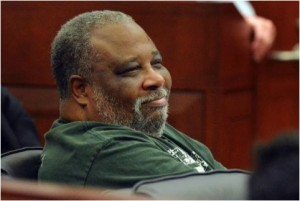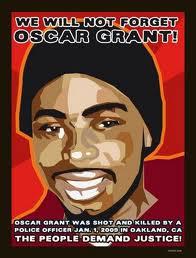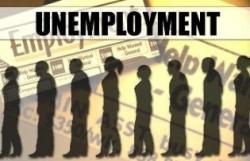The Question of Power
An Interview with Saladin Muhammad
 Saladin is a founder and organizer with the Black Workers for Justice, based in North Carolina. He was recently arrested for protesting at the NC General Assembly on May 13th and became a member of the 940 Moral Monday Arrestees and the first to be convicted. He is also a lead organizer with the Southern Workers’ Assembly? This interview was conducted by Buben Solis and Niqua Douglas and published in the Fall/Winter Issue of “As Goes the South” a publication of Project South.
Saladin is a founder and organizer with the Black Workers for Justice, based in North Carolina. He was recently arrested for protesting at the NC General Assembly on May 13th and became a member of the 940 Moral Monday Arrestees and the first to be convicted. He is also a lead organizer with the Southern Workers’ Assembly? This interview was conducted by Buben Solis and Niqua Douglas and published in the Fall/Winter Issue of “As Goes the South” a publication of Project South.
Ruben Solis: What was your entry point into the overall movement?
Saladin Muhammad: It was in the early 1960s, I was active in the military where I was exposed to a lot of racism. I was in Santo Domingo in ‘65 before I was out of the service and got pretty deeply involved in the struggle against racism in the military happening against Dominicans and against Black soldiers. What probably triggered me was in 1964, a Black soldier from my barracks was lynched/hung. This brother was on his knees with a rope around the neck. Some white soldiers were sitting in the barracks shining their boots claiming they knew nothing about it. He was dead. That led to a rebellion at Fort Bragg, North Carolina. When I left the military, I joined the black liberation movement and the civil rights movement.
Ruben: That was quite a moment for liberation groups. The Caamano revolution was happening at the time as were student protesting the presence of US marines, and the shooting at students with live ammo, and even killing some students to stop the revolt. The US Marines were responsible for putting down the military rebellion by the progressive nationalist officers.
Speaking of Black Workers for Justice and the Black and the African Liberation movement, how do you connect those to the Moral Monday protests?
Saladin: The South has always been pretty central to the oppression of African American people in the United States, and as you know, the South and Southwest have been regions where national oppression of African Americans, Mexican Americans, those from Mexico, and indigenous people in the West has happened. The examples of structural racism, which we call national oppression, has always been the strongest in the South, an anchor for how we express ourselves, an example for the rest of the country.
My mother was from the area where I live now, although she went to Philadelphia in the thirties and I was born there. I came down here (North Carolina) every summer and knew a lot of people. I got married shortly after leaving the army to Naeema who was born in Rocky Mount, NC and we moved to Philadelphia, PA. We were very active in Philadelphia for fifteen years, and decided to move back to Rocky Mount to continue this work in the South. We began building Black Workers for Justice in 1981 around a struggle for three sisters fighting against race discrimination at a K-mart store in Rocky Mount. We developed a petition asking people to sign demanding that the K-mart rehire the workers and other demands dealing with worker rights. Some people went around to the churches and other community places with the petition. A couple of us went to work places where we spread the basic. The workers we spoke to realized they faced the same problems in their workplaces. In 1982, we began to form a state-wide organization, and we have been deepening that infrastructure since then to build consciousness in the black community and among Black workers about the need to build organization and power at the workplace.
The Moral Monday struggle grew out of a people’s assembly organized in 2007 that became known as HKonJ – Historic Thousands on Jones Street, where the state capitol is in Raleigh. We established a fourteen-point program about particular issues such as collective bargaining rights. Others were against the war, for healthcare, and public education. That program guided HKonJ, which has 120 NAACP branches and 150 other organizations of various types that began to battle the legislature, which at that time was Democratic Party-controlled. The emergence of the Tea Party as a right-wing and racist social movement financed by elements of the 1-percent capitalist elites that was shaping a political climate of intimidation and attacks on vital needs and rights of working-class and oppressed, became a major factor in the development of the Moral Monday Campaign. The Moral Mondays are led by Rev. William Barber II, President of the North Carolina State NAACP.
Moral Mondays, began to raise challenge the legislative attacks on voting, immigrant, women’s and gay rights, on the social safety-net and the racist impacts of these attacks as morally wrong. This took the high-ground away from the so-called moral agenda of the right-wing that has consolidated a base among religious fundamentalist to dictate what is moral and what is immoral, including issues like a women right to abortion, sexual orientation, etc. We wanted to show that the real immorality is attacks on health care, unemployment, and dismantling public education. Those are the things we see as immoral. It became a counter-movement to challenge and defeat the social base of a corporate financed push for austerity and increasingly repressive government.
Moral Mondays drew large numbers of people, including many whites, some that had been previously influenced by the so-called moral agenda of the right. Identifying an issue every week became part of the Moral Monday movement building process. I became part of the delegation organized by the Southern Workers Assembly (SWA) for the Moral Monday 3rd wave on May 13th. Labor is weak in North Carolina, less than 3% are organized and many don’t have contracts. The identity of the rank and file of the old labor movement was not showing itself as part of the Moral Mondays. We as a labor contingent, wore yellow bands, bringing up the issues and calling on the rank and file at workplaces to become a more visible part of this movement. The anti-worker, anti-union, racist policies and attitudes of the state legislature created a climate at workplaces that increased the management’s abuse of power to intimidate and oppress workers. We wanted to be visible at both the workplaces and the General Assembly.
The entire labor delegation, about ten of us, were arrested, mainly from my union the NC Public Service Workers Union-UE Local 150, but also some letter-carriers, workers from FLOC (Farm Labor Organizing Committee), and Black Workers For Justice. Shortly after that, we organized the Labor Fight-back Conference in late June 2013 that brought more forces together from wider areas. We’re engaged in the Workers Democracy Campaign that developed out of that conference.
Ruben: That is awesome. There was a lot of thinking that went into that. It’s impactive, not only locally but in terms of the political moment. What do you think the Southern Workers Assembly needs to do to bring a workers’ movement together for the South?
Saladin: Last year, at the opening of the Democratic Convention in Charlotte, NC we brought together workers in the Southern Workers Assembly to begin to develop a program of action. During the Convention, there had been a veiled threat from the AFL-CIO that they would not participate because it was being held in a right-to-work state. There was news coverage about the threat. We saw it as an opportunity to call for a convergence of unions, worker organizations and worker centers in the South in the form of a Southern Workers Assembly to begin developing a program and rank-and-file workers movement to organize labor in the South. There was national and international news coverage of the Southern Workers Assembly as the only voice promoting amidst the many activities created by the Democratic National Convention speaking to organizing labor in the South.
Finally, we were part of developing a resolution that one of the labor councils close to us sent to the AFL-CIO about organizing in the South. To be able to appeal to the rank-and-file of the national unions to push for the carrying out of the resolution, we need a strategic campaign on the ground. We need other forces. The rallies held by the Southwest Workers Union in San Antonio, Texas on November 1st along with those in NC, and a petition campaign with more than 1500 signers sent to the NC Government, the Courts and Obama to drop the charges against the 940 Moral Monday arrestees, shows the potential for the SWA to expand. The question of consolidating as an assembly has included challenges, including resources to have the concentration we really need, the importance of a regional campaign, to connect more people to this campaign. These are the questions we are facing.
Ruben: One of the working groups that materialized at the Southern Movement Assembly in Jacksonville was from a worker/labor front of struggle and brought their issues to the assembly. We still have to follow up and build that up as an Assembly. Not inventing another assembly, but converging with the Southern Workers Assembly. It could multiply geometrically the power of the workers. One of the notions that the University Sin Fronteras and the Southern Movement Assembly process has been working with is the U.S. South as the labor colony for the United States. With the labor laws that restrict collective bargaining and striking that make it almost illegal to be in a union in the south. What are some next steps to change the correlation of voices to enable more systemic changes?
Saladin: You’ve laid out the Southern Movement Assembly. A couple of us attended to the Assembly in Jacksonville, Fla. We were impressed by the gathering of forces, the discussion of issues, and what it means for building an infrastructure and linking labor to the other social movements. I had a discussion not long ago with Brother Emery about how to look at some kind of labor commission/component of the SMA so that a part of the digging in of the Southern People’s Movement will be in the workplaces as well. That is part of your question about how to prepare for the next phase. A movement has various components. We have to figure out how to build strategic bases and areas of contending power in the South. The South has the highest concentration of foreign direct investment and global capitalism. All kinds of concessions from county and state governments. So these locations of new plants come from those new resources as a part of finance bringing industries into the South.
In Mississippi, there’s the Jackson Plan, which seeks to use the election of Chokwe Lumumba as mayor as a part of a state-wide strategy to build areas of people’s governance and a beginning of areas of contending power. How do we as a Southern People’s Movement/Assemblies begin to help the various states and locations throughout the South to develop these strategic zones of contending power? How do we look at taking control of institutions: school boards, hospital boards, etc. To go against the forces bringing in capital. How do we develop a perspective about that as part of the broader Southern Freedom Movement? These are thoughts about the next steps.
Ruben: That’s fantastic. Our strength and power will come from building that infrastructure together so we can sustain a long-term movement. Some of us will not be here forever, but if we go beyond the single-issue approach to build people’s power, we can correct weakness form earlier decades. We appreciate your words and your wisdom, especially concerning the social movement struggles. Thank you for your time, Brother Saladin, and your commitment.
Niqua: I would like to continue this conversation that we started on the Youth Speak Truth radio show, Friday of next week, if possible, November 29.
Saladin: We’ve got to see that as this crisis deepens, there are going to be all kinds of struggles, fight-backs that we have to be a part of, but the problem has been that we enter them and lose the focus on our bigger strategy. We have to engage from a strategic orientation for the struggles to come. New directions are often shaped by these struggles if there is no strategic program that anchors and guides our work. This has been a weakness because the fight-back has been a protest against injustice and not struggles for power. It’s not so easy, but we have to go into these struggles with more than simply a hope to achieve the immediate objective. How do we try to reshape power relationships to give more power to the people? When we are just protesting injustice and we are not using these struggles to reposition our movement and get into a more offensive posture. We are beginning to understand and practice the difference between the struggle for the reform and the struggle for rightful change. We have to keep those things in mind and hopefully the assembly movement and other collaborations will help build this kind of thing and strategic unity. ⍟






